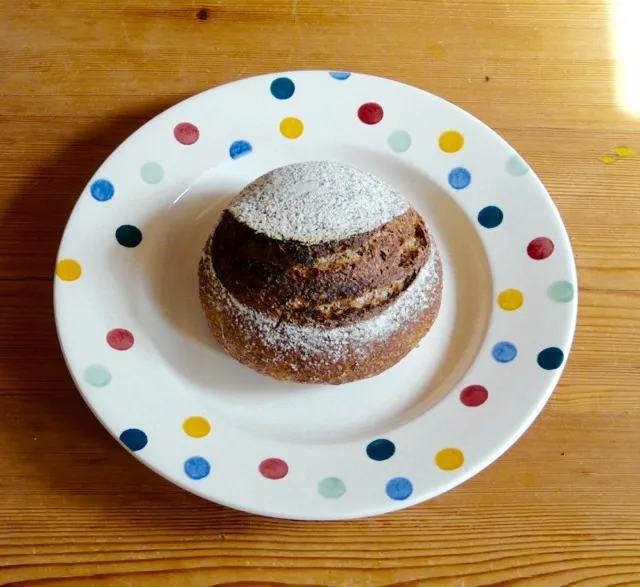
I love white sourdough but always come back to the fact that wholemeal is more healthy for me (and my wife) because we eat so much! Wholemeal (wholewheat in USA?) is harder to work with, has less gluten, rises less but does taste good.
I notice many wholemeal recipes have a fair percentage of white bread flour (I have used 30% white to improve the rise and crumb) but I wonder how many people actually use wholemeal only?
The loaf in the photo is probably not my best example as it is slightly under proved and made from a very young starter, but boy it tastes so good! It is a very small loaf made with 200g of wholemeal flour and 60g of wholemeal rye levain.
Anyone else make wholemeal bread (or even mini loaves!) ?
but mine are usually Pullman loaves, not free-form. BTW, the plate in the picture is very cute.
I think it matters if you grind it because its so fresh and moist not so dry. And sift. I hope to learn more.
For my micro bakery I bake several kinds of 100% whole grain loaves, mostly hearth breads. Some low gluten flours like spelt or einkorn get more stability (rise better) by adding protein (yogurt) to the dough. Breads I make for myself, where oven space is of no concern, I often bake in a Dutch oven so they can't spread.
For whole grain breads I do recommend Peter Reinhart's "Whole Grain Breads" - it improved my whole grain baking immensely.
Happy Baking,
Karin
The plate is from UK manufacture of English pottery.
hanseata, that sounds great, can I ask how much yoghurt you add please?
of the total flour weight. You can use yogurt, buttermilk, kefir or milk, adjusting the water amount a bit for very thin buttermilk (cultured US buttermilk is thick like kefir)
You might check out my Spelt Walnut Bread, made with buttermilk: http://www.thefreshloaf.com/node/22236/dinkelwalnussbrot-spelt-walnut-bread
Karin
But usually have to add 40-60% white to lighten up the loaf. I'm told all the time that my bread is too filling which I feel is an indication of nutritional value. Also like to mix different wheat and other grains. I agree with hanseata about Reinhart's Whole Grain Bread.
http://www.thefreshloaf.com/node/45722/wheat-flour-turns-out-gummy-bread-flour-apparently-not
I just finished typing this and the explanation may be helpful. That is a very pretty little loaf! Do you have a crumb shot?
The lightness of a wholemeal loaf is really dependent on adequate hydration of all those branny bits and good development to windowpane. Correct proofing is important to any loaf but it is important to know that the whole grain doughs can sometimes get overproofed very quickly so they need to be watched a little closer until you develop a feel for that particular dough.
I agree with you that I feel best when I am eating my homemade, 100% WW bread. I didn't realize that until I took a necessary hiatus (travelling). My system just felt out of balance until I was back on track with my WW, whole grains and cultures (kefir,yogurts,etc).
Sorry, it didn't last long enough! (I guess that's the problem with making tiny bread) :)
only with commercial (organic) yeast, not sourdough. I found the sourdoughs come out far too sour for my customers tastes at any rate. (I could make them a lot less sour, but the overnight/lazy process I use doesn't lend itself to that)
My yeasted wholemeals are made at 80% hydration level, autolyzed for 2 hours, then the salt & yeast kneaded in, then left overnight before the scale/shape/prove stage. They are baked in tins. Yeast is just a tiny fraction of what I'd use for a "normal" 1-2 hour rise + proof.
I also make a half & half - half white, half wholemeal. Again yeasted with the hydration at 70%.
I'm not convinced there are any health benefits to 100% wholemeal - there is some evidence to suggest that the bran does more damage than good to your inner plumbing, but who knows. I'm not a great fan 100% wholemeal either, but some of my customers are so I make them.
-Gordon
in the search box you will get more than 10 pages of hits on this site for all kinds of 100% whole grain breads.